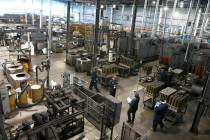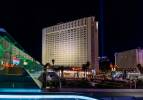Consultant says additional casino would cost Bay State tax revenue
BOSTON — Massachusetts will collect less gambling tax revenues if two casinos rather than one are allowed to open in its southeastern corner near Rhode Island, a state consultant’s report released Tuesday suggests.
The analysis by HLT Advisory shows the state could see $28 million to $42 million less annually with two casinos rather than one in the region.
The findings were presented to the Massachusetts Gaming Commission as it opened a multi-day review on a Brockton project seeking the state’s third and final resort casino license. Tuesday’s review covered the proposal’s finances, economic development impact and site plan.
Commissioners meeting in Brockton rated developer Rush Street Gaming highly for its financial strengths — including the ability to take on debt for the estimated $677 million project — as well as its experience operating regional casinos across the country. The Chicago-based firm owns casinos in Philadelphia, Pittsburgh and other cities.
But commissioners gave the project lower marks for its revenue assumptions. Commission Member Enrique Zuniga voiced concern Rush Street Gaming “does not fully appreciate the magnitude” of having of a rival casino nearby.
The Mashpee Wampanoag tribe broke ground last month on a nearly $1 billion resort that doesn’t require state approval because it’s on sovereign tribal land.
Other commissioners also dinged Rush Street Gaming for providing little detail on plans to boost the local economy and enhance state tourism efforts, including how it would leverage its proximity to the vacation destination of Cape Cod.
Commissioner Bruce Stebbins said the company relied too heavily in its application on “past practice at other casinos to demonstrate ‘what we’ve done,’ rather than explain ‘what we intend to do’.”
Others gave the project less than stellar marks for its site design. Commissioner Lloyd Macdonald credited the proposal for being “well organized,” noting its proposed red brick facade harkened to New England’s historic mill buildings, but he also suggested the casino exterior presented “no unique theme.”
Leading up to Tuesday, the Mashpee Wampanoag tribe and Rush Street Gaming had issued competing studies about the financial implications to the state of their proposals.
The tribe argued that having only its casino operating in the region would generate more state tax revenue than having both open. The company maintained that two casinos would provide a greater overall economic development boost, including more jobs and more local spending.
HLT’s report released Tuesday appeared to tilt in favor of the tribe’s assessment.
It concluded the state could draw about $433 million in annual gambling tax revenue if it had four casinos: Wynn’s Boston-area development, MGM’s Springfield project, the Plainridge Park slots parlor in Plainville and the Mashpee Wampanoag facility.
But the state would collect between $391 million and $405 million in annual gambling tax revenue — or about $28 million to $42 million less — if Rush Street Gaming’s casino also opened.
Plainridge Park opened last summer and the tribe expects to open its casino in part by next year. Wynn and MGM already have state licenses and expect to open their facilities in late 2018. Rush Street Gaming’s casino for the Brockton Fairgrounds would open in 2019.
The commission’s review continues Wednesday. The five-member panel is expected to vote as soon as Thursday on whether to grant the project a license.























